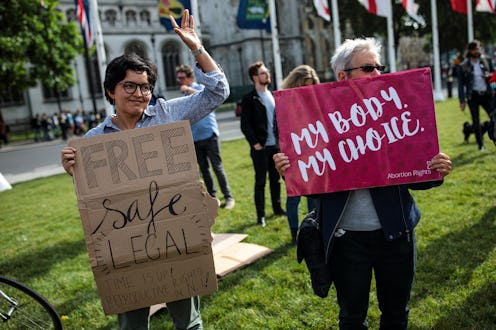News
Northern Ireland Is Set To Legalise Abortion & Same-Sex Marriage From Midnight

After a hard-won campaign involving years of activist effort, abortion and same-sex marriage will be legal in Northern Ireland from midnight on Oct. 21. The legislation is not a result of Northern Ireland's choosing, but one voted for by politicians in Westminster.
Back in July, Labour MPs Stella Creasy and Conor McGinn proposed the decriminalisation of abortion and legalisation of same-sex marriage in Northern Ireland respectively. Both proposals received notable majorities, reports Sky News, meaning Northern Ireland had until midnight on Oct. 21 to restore its Parliament to stop the changes. (It has been suspended since 2017, per iNews, after disagreements between two main political parties.)
The country's Parliament — known as Stormont — hasn't done so, relieving many campaigners. However, the Democratic Unionist Party (DUP) has scheduled a recall for Monday to protest the impending legislation. Critics have said it is "disappointing" to see that blocking much-needed reform is the only reason some politicians feel the need to return.
But the move will thankfully have little impact, per the BBC, as Northern Ireland would need to form a functioning government before having any vetoing power. A move that is highly unlikely to happen before midnight considering only a third of political representatives are scheduled to attend, reports ITV.
Northern Ireland is currently the only part of the UK where abortion and same-sex marriage is not legal. This is down to these areas being devolved powers, i.e. the responsibility of Northern Ireland's Parliament, rather than Westminster's.
Current Northern Irish abortion laws dictate that an abortion is only legal if there is risk to a woman's life or risk of permanent and serious damage to her physical or mental health. Abortions outside of these parameters can result in a maximum sentence of life imprisonment for both pregnant people and any medical personnel who assist. This is even the case for incidences of rape, incest, and fatal foetal abnormalities.
In early October, the High Court in Belfast ruled that Northern Ireland's abortion law breached the UK's human rights commitments, per the BBC. Sarah Ewart — a woman who had to travel to England for an abortion even though doctors said her foetus would not survive outside the womb — brought the case to court. But the judge did not make a "formal declaration of incompatibility" due to Westminster's upcoming legal change.
If the Northern Irish Assembly does not reconvene by midnight, abortion services will be routinely offered in Northern Ireland from March 2020, reports iNews. Until then, people who need an abortion will be assisted with finding a provider in England.
In the case of same-sex marriage, couples will be able to issue 28 days' notice to marry from Jan. 13, 2020. The first same-sex weddings are therefore expected to occur in Northern Ireland on Valentine's Day.